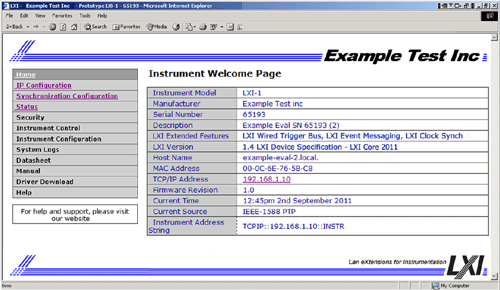LXI Device Specification 2016 Version 1.5 is defined as a set of
“Core” features and optional Extended Functions, which have
replaced the Class model in previous versions. The following is a summary of the
key features of the LXI Core specification:
Open industry standards
LXI is based on widely used industry standards such as TCP/IP Ethernet, IPv4/IPv6, Web browsers and IVI drivers.
High-speed Ethernet I/O
LXI is based on Ethernet technology, the most widely accepted
communications interface in use today. Ethernet I/O provides
backward compatibility and standard connections. Nearly
every computer is manufactured with an integrated Ethernet
interface, and networking hardware is becoming increasingly
inexpensive.
Built-in standardized Web interface
Many test and measurement instruments provide Ethernet/LAN connectivity, but the LXI standard ensures that
instruments support W3C-compliant browser-based
information in order to be compliant with the LXI standard.
With the Web interface users can:

- Easily configure and operate the instruments from a
graphical user interface (GUI)
- Collect and analyze data without software programming
- Operate instruments remotely, either across the lab or
across the globe
- Set parameters for IEEE 1588, LXI Events, and the LXI Wired Trigger Bus (for devices that support these optional Extended Functions)
Interchangeable Virtual Instrument (IVI) drivers
All LXI devices include an Interchangeable Virtual Instrument
(IVI) driver for programmatic control. The IVI driver provides
a consistent programming interface for all LXI devices. The
IVI standards ensure that the driver works well in a variety
of programming environments, provide high performance
interfaces, and ease program development and maintenance.
LXI instruments optionally provide IVI class-compliant
drivers. Class-compliant drivers also comply with common
definitions for classes of instruments and simplify instrument
interchangeability. For more information regarding IVI
drivers, visit the IVI Foundation web site.